- Home
- Lisa Wingate
A Thousand Voices Page 8
A Thousand Voices Read online
Page 8
Tipping her head to one side, Autumn squinted at me, opening and closing her fingers in a timid wave.
I waved back, and she smiled, her eyes twinkling in a frame of long black lashes. I wondered if she was Choctaw. She looked like she was. Hers was the round, dark face I saw in the mirror when I was eight or nine years old—the face I hated, because it wasn’t like all the other faces at school in Hindsville. There were no Choctaw faces there. I didn’t fit in, and everyone knew it.
But here, Autumn smiled at me, and I knew it was because I had a Choctaw face. For the first time in my life, I had a sense of belonging because of the way I looked, rather than in spite of it.
“Bye,” I whispered, and Autumn turned to scamper off.
A smaller boy stopped her before she rounded the tent. “Ummmm,” he said, slapping a hand over his mouth, and pointing.
Shrugging, she hissed, “Hush up, Willie.” Then she snatched his hand away from his mouth and turned to leave with him in tow.
Pulling against her grip, Willie gaped over his shoulder in my direction. “Who’zat?”
Autumn rolled her eyes like the mother of a badly behaved child, her look saying, Kids! What are you gonna do with ’em? “A lady,” she whispered, sounding surprisingly parental considering her age. “It isn’t nice to stare at people, Willie. Come on.” With a yank, she dragged him forward, stumbling.
“Is she one of our aunts?” Willie surveyed my campsite as Autumn pulled him along.
“I don’t think so….” Autumn’s voice trailed off uncertainly, and they disappeared behind a red tent, their shadows purple against the crimson screen.
“She looks like one of our aunts.” Willie’s shadow glanced back again.
“Hush. She’s just camping there, that’s all.”
“How come she don’t got any camping stuff or a tent?”
“Shut up, all right. You’re gonna get us in trouble, stupid.”
“Ummm. You said a bad word, I’m gonna tell Dad, and he’ll…”
The shadows melted away until finally they disappeared. In the tent camp, the noise died down, and the children quieted as supper was served. In the RV on the other side, a rerun of Gunsmoke was blaring on the television.
The light from the motor home windows cast a pale glow over my campsite as I walked back to the car and retrieved my backpack. Setting it on the table, I dug out my leftover airline snacks and laid them out in a line. Two bags of peanuts, a Milky Way bar, a bottle of water, a pack of gum, and a few chocolate-covered almonds I’d bought at the gourmet candy store in the airport.
“Almonds and Milky Way for breakfast,” I muttered, tucking them into my backpack. “And peanuts.” Adding one bag of peanuts, I opened the other package, then took out the water bottle, which I could refill later at the restroom. Never let it be said that I didn’t have survival skills.
A park ranger’s truck cruised by, and I stiffened as it stopped at my campsite. Standing up, I prepared to explain that I hadn’t yet made it up to the ranger station to pay the camping fee.
The ranger waved, then glanced toward the tent camp and waved again before driving on.
“Doesn’t look like much of a supper.”
The sound of a man’s voice surprised me, and I stumbled backward, turning clumsily to find a stranger standing outside the tent circle. His face was silhouetted by the firelight, so that I couldn’t tell much, except that his hair was shoulder-length, kind of blunt cut, and he was tall and slim, dressed in jeans and some sort of button-up shirt that let the light show through.
“I’m sorry?” I muttered, not sure what else to say, or why he was there, or if I should be nervous.
“That isn’t much of a supper,” he repeated, motioning to my collection of snack food. “We’ve got plenty next door.”
“Oh, no…no, thank you,” I stammered, blood rushing into my face, because, even in the dark, I could tell by the tilt of his head, the slight rounding of his shoulders, that he felt sorry for me and thought I needed help. In the back of my mind, I could hear Uncle Bobby saying, We don’t need nothin’ from nobody. You stay away from people, y’hear? “I’m fine.” I thumbed over my shoulder toward the park office and restrooms up the road. “I…ummm…ate before I came, and actually I’d better head up to the ranger station and pay for the campsite, and…” And what? Set up my tent? Pull out my sleeping bag? I didn’t even have a flashlight. If I drove to the office, I might come back and find my campsite gone; then I wouldn’t have anyplace to stay.
My visitor came closer, slipping his hands into his pockets, perhaps to let me know he didn’t mean any harm. “The campsite’s already paid for.” He leaned toward me as if we were sharing a secret. “You’re welcome to use it, though. It’s fine.”
“Oh, no, I…” Where was I going to go? Now? In the dark? “If it’s yours, I can leave….”
“Really. It’s fine.” He filled the gap in my sentence, and in the dim light I caught a reassuring smile. “Just don’t tell anybody you didn’t book this one.” He chuckled under his breath in a warm, natural way that was nice. “Long story, but when Nana Jo lays out that big seven bucks for a campsite, she wants to be darned sure she gets her money’s worth. She won’t admit the Reid family’s big enough now that we need four campsites, so we secretly book a fourth site for overspill. Saves a lot of family discord that way.”
I felt my body sag forward, the tension flowing out of me. “I’ll never tell.” The words conveyed much more relief than I’d meant them to.
He chuckled again, and I felt more comfortable. If he knew I was desperate, he was kind enough not to point it out.
“So you’re having a family reunion over there?” I nodded toward the tents, watching the shadow people move in and out of the firelight near their picnic table.
“Every year.” His hand disappeared into the darkness as he combed stray strands of hair away from his face, then tucked his hand back in his pocket. “We always hold a Reid family campout during the Choctaw Labor Day Festival. Usually there are a few more of us. We’ll probably get some late arrivals in Camp Reid, yet.”
Leaning against the picnic table, I peered past him toward Camp Reid. “I don’t know where you’re going to put them. Are you sure I’m not in the way here?”
He shook his head. “Not a bit. Just go ahead and make yourselves at home.”
“There’s just me.” That wasn’t such a brilliant thing to let on.
His shoulders raised and lowered in a silent go figure. “Well, anyway, don’t feel like you have to just sit here on the picnic table. Feel free to set up your tent, drag out your cooler, whatever. If you need some help, I could probably get a couple of kids on loan for you. Just don’t tell them you didn’t actually rent the campsite. If it gets back to Nana Jo, it’ll be a Reid family meltdown. Not pretty.”
I chuckled, fully able to relate to the concept of family meltdown. We’d been known to have a few of those ourselves. “I wouldn’t want to be the cause of that. My lips are sealed, I promise.”
“Great…good.” His silhouette hesitated, seeming unsure of what to do next. He glanced over his shoulder toward the camp, and I caught the profile of a strong nose and wide, full lips. “You need any help over here or anything?”
“No. But thanks. I don’t have a tent or gear to unload.” His head tipped to one side, and I added, “I hadn’t planned on camping, but when I got here, all the hotels were full. I didn’t know there was a big festival this weekend.” For a second, I hoped he would ask why I was here. I wanted to tell someone the whole story, to see how crazy it sounded when I said it out loud. Of course it’ll sound crazy, another voice whispered inside me. You’ve already told him too much.
He surveyed my car. “Well, then, you’re in for a treat. You haven’t been anywhere until you’ve been to the Choctaw Labor Day Festival.” The words held a mild note of sarcasm. “Big doin’s in Pushmataha County.”
A soft breeze wandered through the campground, carrying the scent o
f barbecue. My stomach gave an embarrassingly loud growl.
“Sure you don’t need anything?” he asked, turning an ear toward the tents again, so that I caught another glimpse of his face. He was nice-looking, with Native American features, like an actor in some old western movie. Probably a few years older than me.
“Yeah, I’m sure.” Rubbing my palms together, I pressed my hands to my lips and blew hot breath over my fingers. The evening was turning surprisingly cool, and there was a faint scent of rain in the air. It would be a long night in the car. “I’m going to turn in pretty soon, then get up in the morning and”—and do what?—“get busy.” Next door in the camper, the Gunsmoke music rose to a crescendo, complete with blazing guns and whooping Indians. I winced, feeling vaguely embarrassed. “I might wait until things quiet down in Dodge City, first.”
He gave the joke an appreciative nod. “Watch out for the neighbors. They don’t like Indians.”
I drew back, surprised by the frankness of the comment.
“Hey, Jace, you coming?” A woman’s voice called from beyond the tents. “K-bobs are on.”
“Right there,” he answered, then turned to me before he left. “Come on over, if you get bored. Got shrimp on the barbie.” His imitation Australian accent made me laugh.
“Thanks. But I don’t want to bother you all.” Once again, I was tempted. Food and companionship sounded better than sitting by myself in the dark, waiting to see if a storm would blow in. Someone in the camp was clumsily trying to tune a guitar, and even that was alluring. I wanted to go over there and put the instrument in tune the way James had taught me.
Jace turned to leave. “No bother. Come over if you change your mind. There’ll probably be something on the grill all night long.” He headed back to Camp Reid, his strides long and unhurried.
I watched first his body, then his shadow disappear behind the tents, until once again I was alone. The park ranger cruised by, slowing but not stopping as he passed. On the lake, a boat rumbled past, its lamps reflecting red, yellow, and white streaks on the water. Across the park, someone hollered a string of obscenities, then a campsite burst into raucous laughter.
The closing theme to Gunsmoke played in the motor home. First the television went off, then the lights, leaving me in darkness.
In Camp Reid, a woman was helping children put on pajamas in the red tent. The silhouette of a toddler jittered up and down with raised arms as the woman slipped a nightgown over her head, then fished her long hair from the neckline, twisted it into a ponytail, and kissed the top of her head.
The flute began playing a soft tribal melody I’d never heard before.
I stood up and walked through the darkness, toward the music.
CHAPTER 7
I stopped at the edge of the fire’s glow, stood there in the murky light outside the circle and took in the grouping of people sitting in lawn chairs, atop ice chests, on overturned buckets. An elderly man was perched on what looked like a boat seat, and near the fire kids sat on blankets and sleeping bags, cradling plates of food. The scene was peaceful, the campsite filled with a soft hum of chatter and laughter intermingled with the crackling flames and the sweet, clear notes of the flute.
Searching for the flutist among the crowd, I found myself entranced by the faces. Young faces, old faces. Dark hair, brown eyes, round cheeks and sienna skin, like mine. Not all of them, of course. Some of the young people had blond hair, red hair, fair skin, blue eyes. But in the crowd of perhaps thirty people, most of the faces looked like mine. It was the first time in my life I’d ever been in the majority.
I felt a sense of belonging, as if I’d hungered for this but never realized it. A sharp blade of shame quickly rooted out that idea, cut it away like a rotten spot in an apple. James and Karen didn’t look like these people. Aunt Kate, Uncle Ben, the rest of my family didn’t look like these people. No one who loved me looked like this. It was wrong to think that the dark hair and brown skin had anything to do with our capacity to be a family. It was like wishing James and Karen weren’t my parents.
The conflicting emotions were too hard to understand, so I concentrated on the flute music instead. The flutist was sitting cross-legged on a stone picnic table, bent over his simple wooden flute in the soft white light of a hanging Coleman lantern. He was young, probably still in high school. As he swayed with his instrument, his hair fell around him, long and thick, a gleaming blue-black curtain in the lantern glow. Closing his eyes, he tipped back his head and allowed the melody to sift into the night. A puff of breeze caught his hair, spinning it around him in a web, laying dark ribbons against his white cotton shirt, then whisking them away. He seemed otherworldly, as if he might open his wings to the music and take flight, like an angelic being in some southwestern work of art.
I saw myself at fifteen, in a photograph Karen took. I was standing on a rock ledge above the river, my eyes closed and my hair sailing on the breeze. My violin was tucked beneath my chin, my fingers curled over the bow as I played the bridal march for my cousin Jenilee’s wedding in a grassy clearing on the riverbank. The music joined with the earthy sounds of water stroking rocks, leaves whispering, breeze combing the spring grass. Somewhere in the distance, a dove called to its mate. All around me, inside every part of me, there was music, and I was lost in it.
I never saw my cousin walk up the aisle between her brothers, Drew and Nate. I didn’t see the audience rise, or Jenilee’s grandmother, Sadie, begin to weep in the front row. I was in the music, taking flight, disappearing among the sycamore leaves, echoing from the rock bluffs across the river. When I finally opened my eyes, I realized I’d played too long. Brother Baker and the wedding party were all in place, waiting to get on with the ceremony. Beside Jenilee, Nate was grinning at me. I’d always had a crush on Nate, but nothing ever came of it. He was a college boy, and I was just a kid in high school. Nate always had too many girls around him to be interested in me. But that day at the wedding, he looked at me like he saw something different, something more. When I was into my music, I was larger than myself, transcendent in a way that couldn’t be explained in words but only understood by the spirit. I felt as if I could hear God breathing all around me.
Watching the flute player, I relived that feeling, that sense of being filled with spirit, beyond the physical, pure and at peace. These days, my mind was cluttered with so many other things, I was never at peace. Grandma Rose used to say that a cluttered mind was a sign of an untidy life, and she was right. My life was untidy—a closet hastily stacked with unwanted emotions, unexamined memories, unanswered questions. To put things in order, I would have to pull everything out, examine all of it, and decide what was worth keeping. It was easier to leave the mess behind the door.
Autumn noticed me standing at the edge of the firelight as she walked back from the pickup camper that served as a camp kitchen. Tipping her head to one side, she regarded me with her lips pursed, then tossed her hair over the shoulder of her pink Barbie nightgown, lifted a hand with a cookie in it, and waved tentatively.
I waved back, and she popped part of the cookie into her mouth, then circled the fire and climbed into the lap of a man sitting in a lawn chair with his back toward me. After handing him a canned soda, she curled her legs underneath herself, and eyed me over his shoulder.
The flutist played on, though the crowd around the fire hardly seemed to notice. They went about the normal business of finishing supper, throwing away paper plates, opening and closing ice chests.
“Come eat something, Dillon,” an elderly woman called to the flute player. “The food’s getting cold.”
“Be there in a minute, Nana Jo,” he answered, then caught his breath and brought the flute to his lips again.
Nana Jo shook her head, the turquoise clip on her gray bun glittering in the light from a string of colored camp lanterns strung between one of the tents and a nearby tree limb. “Dillon Albert Reid, you better listen to your Nana Jo. You’re going to starve to death.”
> A young woman sitting beside Nana Jo shoulder-butted her. “Nana, you think everyone’s gonna starve to death.”
The family members laughed, and Nana Jo sat back in her chair, crossing her arms so that her thick turquoise-and-silver necklaces jingled against her flowered cotton shirt. “When all of you starve to death, Shasta, don’t come crying to me, that’s all.”
Autumn’s brows knotted, and she lifted her head from the man’s shoulder. “Nana Jo, if we starve to death, we won’t be able to.” Everyone chuckled and then Autumn added, “Because we’ll be dead. When you’re dead, you don’t cry anymore.”
The crowd grew suddenly somber, and Nana Jo’s lips trembled in a pleated line.
Autumn rested her head on the man’s shoulder, and he patted her back. “No, you don’t, sugar.”
Autumn’s gaze focused on me again as the circle fell into a meaningful silence. I could only guess at the undercurrent. Her eyes were contemplative and sad, filled with some deep emotion that was mysterious and compelling. I turned to leave, and she cupped her hands around her mouth, whispering something in the man’s ear. He stretched, half turned in the chair and looked over his shoulder at me. I recognized his profile. Jace, the man who’d stopped by my camp before.
“Come on in and grab a bite.” Standing up with Autumn in his arms, he waved me closer, and everyone turned to look. Across the circle, Dillon stopped playing and watched me with a mixture of curiosity and reserve.
A hot flush prickled into my face. “Oh…ummm…I was just…I was just listening to the music. The flute, I mean. I hadn’t heard the song before. It’s beautiful. I didn’t mean to bother you, though. I’m sorry.” Waving vaguely over my shoulder, I backed up a step.
Pushing against the arms of her chair, Nana Jo pulled herself forward in her seat, her eyes like polished black stones, moving down, then up, taking me in. “You’re no bother. Come on and join us, Little Sister. Are you camping nearby?” Her words held a strange rhythm, an accent I couldn’t place.

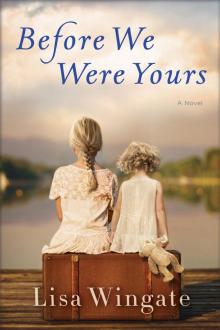 Before We Were Yours
Before We Were Yours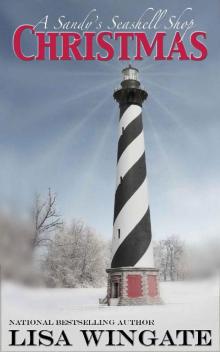 A Sandy’s Seashell Shop Christmas
A Sandy’s Seashell Shop Christmas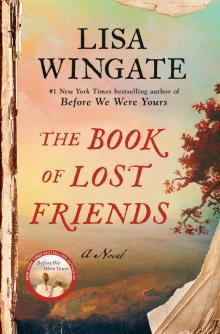 The Book of Lost Friends
The Book of Lost Friends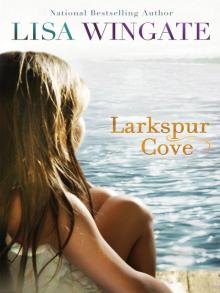 Larkspur Cove
Larkspur Cove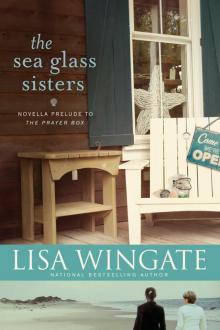 The Sea Glass Sisters
The Sea Glass Sisters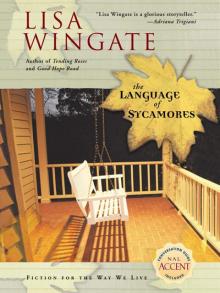 The Language of Sycamores
The Language of Sycamores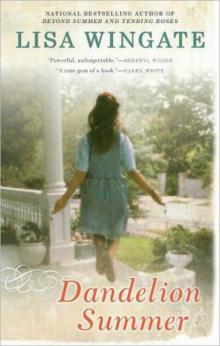 Dandelion Summer
Dandelion Summer Word Gets Around
Word Gets Around Beyond Summer
Beyond Summer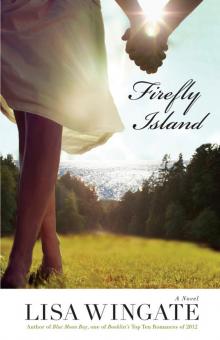 Firefly Island
Firefly Island The Tidewater Sisters: Postlude to The Prayer Box
The Tidewater Sisters: Postlude to The Prayer Box Talk of the Town
Talk of the Town![Blue Sky Hill [01] A Month of Summer Read online](http://i1.bookreadfree.com/i1/03/29/blue_sky_hill_01_a_month_of_summer_preview.jpg) Blue Sky Hill [01] A Month of Summer
Blue Sky Hill [01] A Month of Summer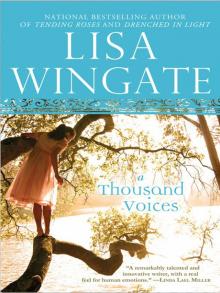 A Thousand Voices
A Thousand Voices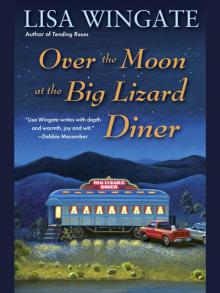 Over the Moon at the Big Lizard Diner
Over the Moon at the Big Lizard Diner Never Say Never
Never Say Never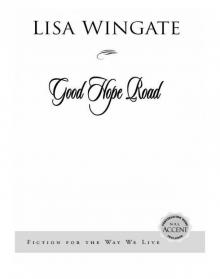 Good Hope Road
Good Hope Road The Summer Kitchen
The Summer Kitchen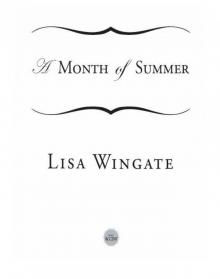 A Month of Summer
A Month of Summer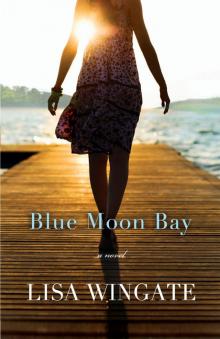 Blue Moon Bay
Blue Moon Bay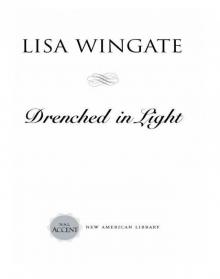 Drenched in Light
Drenched in Light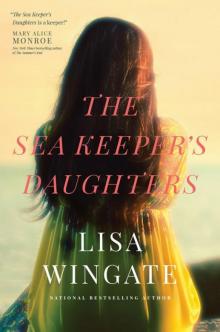 The Sea Keeper's Daughters
The Sea Keeper's Daughters